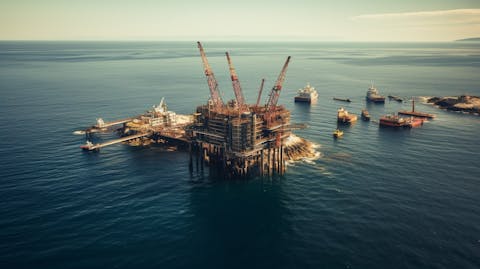In this piece, we will take a look at ten oversold global stocks to buy now.
‘There are decades where nothing happens, and there are weeks where decades happen” is apt when starting a piece about global stocks. The four weeks of November and the first two weeks of December have brought seismic shifts that have reworked the way investors expect the world to function for the next couple of years.
Brushing geopolitics aside, for Wall Street, the biggest event over this period was the 2024 US Presidential Election. A hotly contested battle, it saw President-elect Donald Trump emerge victorious. Trump’s effects on the markets were immediate as investors rushed to pile into sectors that they believed would benefit from the incoming administration’s focus on fewer regulations. Across the globe, the Chinese government also wondered about the impacts of the President-elect’s promised tariffs, while closer to home, governments in Europe wondered if they would have to fend off a glut of Chinese goods that might head their way if America constrained China’s ability to export it with cheap products.
Starting from the stock market, two sectors were notable for their performance once the election’s outcome was certain. These two sectors are the banking sector and energy. The S&P’s bank stock index surged by a whopping 13.8% after the election while energy stocks added 4%. In contrast, the benchmark index jumped by 3.8% to confirm that investors were bullish about certain sectors of the economy.
Since this is a piece about oversold global stocks, it’s important to discuss in detail how the world has responded to Trump’s win instead of analyzing its effects on domestic US stock markets. One of the President-elect’s biggest campaign promises is to enact tariffs against China. In a statement made on his social media platform after he won the election, Trump linked the Chinese tariffs with the deadly drug fentanyl making its way to America’s streets. He outlined that “On January 20th, as one of my many first Executive Orders, I will sign all necessary documents to charge Mexico and Canada a 25% Tariff on ALL products coming into the United States.” Trump added that the tariff would remain in place until “Drugs, in particular Fentanyl” stopped entering the US.
In response, Chinese leaders, who are already struggling with a weak economy are considering whether to increase economic stimulus to battle potential American tariffs. In a meeting top Communist Party officials indicated that they would undertake China’s first monetary policy loosening in 14 years, as they shared that a “more proactive fiscal policy and an appropriately loose monetary policy should be implemented, enhancing and refining the policy toolkit, strengthening extraordinary counter-cyclical adjustments.” The key concern for policymakers in China surrounds their aim of growing the Chinese economy by 5% in 2025. Should President-elect Trump’s tariffs materialize, then America’s imports from China will fall and lead to either lower Chinese economic output or a diversion of its exports to alternate countries. The latter option will be tricky due to the US’ status as the world’s largest economy.
While Trump’s victory was a boon for US stocks, European stocks displayed mixed performance. Tariffs also drove investor sentiment for European equities, whether they were from the EU or from the UK. The Euro 600 stock index added as much as 1.2% after Trump’s victory was announced, but ended up being down 1.26% by the end of the week following the election. European investors were jittery about the President-elect’s promise of 10% tariffs for all imports.
The British FTSE 100 also gained 1% after Trump’s victory but ended up losing momentum and ended in the red soon afterward. Economists believe that as the tariffs could potentially increase US prices, the Federal Reserve can keep rates higher and lead to global currencies falling. Since the election, the Euro and the Pound have lost 3.96% and 2.3% to the US dollar on the back of investor expectations of a stronger dollar in the near-term future.
Before we get to our list of the best oversold global stocks to buy, a brief look at some global stocks that surged following Trump’s win is also important. One stock that surged by 27% is a Swiss mining company with a significant presence in Ukraine. Investors bet on the shares with the hope that a Trump victory would end the conflict in Ukraine. Britain’s largest defense contractor, BAE, surged by 8% as investors tried to get an upper hand on potentially larger defense orders for the firm if the US cuts down NATO funding and asks Europe to contribute more.

An aerial view of an oil rig in the Texas Gulf Coast with people working on it, emphasizing the company’s oil & gas production interests.
Our Methodology
To make our list of the most oversold global stocks to buy, we ranked the 40 most valuable ex-US stocks with a 14-day RSI reading of 30 or lower by the number of hedge funds that had bought the shares during Q3 2024. Out of these, we picked the stocks with the highest number of hedge fund investors.
Why are we interested in the stocks that hedge funds pile into? The reason is simple: our research has shown that we can outperform the market by imitating the top stock picks of the best hedge funds. Our quarterly newsletter’s strategy selects 14 small-cap and large-cap stocks every quarter and has returned 275% since May 2014, beating its benchmark by 150 percentage points (see more details here).
10. Teekay Tankers Ltd. (NYSE:TNK)
14-day RSI Score: 27.29
Number of Hedge Fund Investors In Q3 2024: 18
Teekay Tankers Ltd. (NYSE:TNK) is a Bermuda-based oil shipping company. Given the turmoil in the Middle East and the attacks faced by tankers during transit, the fact that the firm’s shares are down by 23.6% year-to-date is unsurprising. Oil tanker rates have fallen for the past couple of months due to lower demand from countries such as China and production cuts in the Middle East to support oil prices. For firms like Teekay Tankers Ltd. (NYSE:TNK), the macroeconomic turbulence means that they have to focus on their fleet management and overall costs to keep investors happy. Additionally, on the flip side, if Middle Eastern geopolitical tensions subside, then the recovery tanker rates could be threatened due to excessive supply in the region. As a result, Teekay Tankers Ltd. (NYSE:TNK)’s management has to balance a tightrope if it is to run a ‘steady ship’ in the near term.
Teekay Tankers Ltd. (NYSE:TNK)’s management directly addressed these concerns during the Q3 2024 earnings call. Here is what they said:
“Recent events in the Middle East have the potential to further destabilize the region, which could impact oil production and shipping should they escalate further.
The full effects of any such disruption are uncertain, but they have the potential to further add to tanker market volatility in the coming quarters. Turning to fleet supply. New tanker deliveries are set to increase in 2025 and 2026 due to orders placed over the past 18 months to 24 months. However, at around 13% of the existing fleet, the global order book is still below the long-term average of 20%. Furthermore, forward order book cover at the major shipyards currently stretches three years or more with a lack of available shipyard capacity until the second half of 2027. In addition, the fleet continues to age with the average age of the tanker fleet currently the highest since 2002. As can be seen by the chart on the bottom right, number of vessels on order is still relatively small compared to future fleet replacement demand.
The combination of a modest order book, a lack of shipyard capacity and an aging fleet should ensure that tanker fleet growth remains at relatively low levels over the next two to three years. While the pace of tanker scrapping remains very low the past two years have seen a steady flow of vessels from the conventional fleet to the so called, shadow fleet of tankers servicing sanctioned trades, the majority of which are older vessels, which could – which would otherwise be approaching end of life. This shadow fleet now counts several hundred vessels, which generally operate at much lower utilization levels compared to the conventional fleet. While the future of this shadow fleet is uncertain, particularly in light of increased scrutiny and sanctions from both the U.S. and Europe, the migration of ships from the conventional fleet to the shadow fleet adds an extra layer to tanker market volatility.”
9. Golden Ocean Group Limited (NASDAQ:GOGL)
14-day RSI Score: 25.50
Number of Hedge Fund Investors In Q3 2024: 18
Golden Ocean Group Limited (NASDAQ:GOGL) is an ocean carrier that transports dry commodities such as coal, grain, and fertilizers. The firm benefits from the fact that it is one of the largest operators of Capesize dry bulk cargo ships in the world. Golden Ocean Group Limited (NASDAQ:GOGL)’s strength in the Capesize segment offers it the operating base to capitalize on a resurgence in global trade dominated by commodities. Yet, any slowdown in global trade, particularly for the reasons we discussed in our introduction, can end up negatively impacting the firm. Golden Ocean Group Limited (NASDAQ:GOGL) also benefits from being one of the only publicly traded firms with exposure to a large Capesize fleet. Its performance depends on global economic activity and particularly China’s role as a large commodity importer and exporter. Any uptick in global energy prices is also a headwind for Golden Ocean Group Limited (NASDAQ:GOGL)’s shares.
Golden Ocean Group Limited (NASDAQ:GOGL)’s management commented on fleet management during the Q3 2023 earnings call. Here is what they said:
“The Capesize fleet is aging, and over half of the Capesize fleet will be above 15 years of age in 2028, in a period where environmental regulations are tightening. Also, as seen from the fleet profile, the concentration of vessels required to dry dock in the two coming years is expected to reduce fleet capacity further than normalized distribution over a docking cycle.
We lastly see inflation in necessary investments to meet technical requirements, raising the bar for smaller operators of older tonnage. There has been unusually little weather disruptions in the port operations during the fall, which normally leads to delays and tightening of the dry bulk markets. The dry bulk fleet continues to operate highly efficiently with low congestion and only marginal Panama and Suez Canal exposure. The return of physical volumes setting the price of freight has seen a healthy rebound in rates in Q4 following a weaker period, very much as seen in 2023. It illustrates the underlying supply and demand balance in the freight market. We will round off with a reminder of our robust business model, low cost base, and modern fleet which continues to support the free cash flow and dividend potential in Golden Ocean.”





